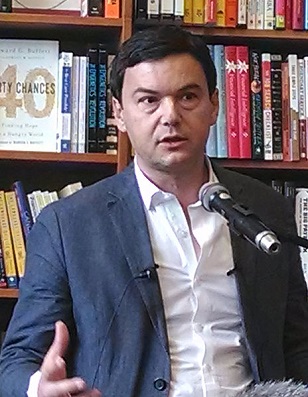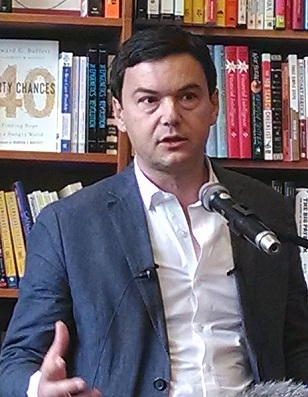 via Wikipedia)” width=”308″ height=”397″ />French economist Thomas Piketty at the reading for his book Capital in the Twenty-First Century, on April 18, 2014 at the Harvard Book Store in Cambridge, Massachusetts. (Photo via Wikipedia)You can order Thomas Piketty’s Capital in the Twenty-First Century directly from Truthout by clicking here. This nearly 700-page book has electrified the debate about capitalism because it argues, with persuasive statistical and historical analysis, that the current economic system insures the increase of economic inequality and undermines democracy.
via Wikipedia)” width=”308″ height=”397″ />French economist Thomas Piketty at the reading for his book Capital in the Twenty-First Century, on April 18, 2014 at the Harvard Book Store in Cambridge, Massachusetts. (Photo via Wikipedia)You can order Thomas Piketty’s Capital in the Twenty-First Century directly from Truthout by clicking here. This nearly 700-page book has electrified the debate about capitalism because it argues, with persuasive statistical and historical analysis, that the current economic system insures the increase of economic inequality and undermines democracy.
Excerpt From the Introduction to Capital in the Twenty-First Century:
“Social distinctions can be based only on common utility.”—Declaration of the Rights of Man and the Citizen, article 1, 1789
The distribution of wealth is one of today’s most widely discussed and controversial issues. But what do we really know about its evolution over the long term? Do the dynamics of private capital accumulation inevitably lead to the concentration of wealth in ever fewer hands, as Karl Marx believed in the nineteenth century? Or do the balancing forces of growth, competition, and technological progress lead in later stages of development to reduced inequality and greater harmony among the classes, as Simon Kuznets thought in the twentieth century? What do we really know about how wealth and income have evolved since the eighteenth century, and what lessons can we derive from that knowledge for the century now under way?
These are the questions I attempt to answer in this book. Let me say at once that the answers contained herein are imperfect and incomplete. But they are based on much more extensive historical and comparative data than were available to previous researchers, data covering three centuries and more than twenty countries, as well as on a new theoretical framework that affords a deeper understanding of the underlying mechanisms. Modern economic growth and the diffusion of knowledge have made it possible to avoid the Marxist apocalypse but have not modified the deep structures of capital and inequality—or in any case not as much as one might have imagined in the optimistic decades following World War II. When the rate of return on capital exceeds the rate of growth of output and income, as it did in the nineteenth century and seems quite likely to do again in the twenty-first, capitalism automatically generates arbitrary and unsustainable inequalities that radically undermine the meritocratic values on which democratic societies are based. There are nevertheless ways democracy can regain control over capitalism and ensure that the general interest takes precedence over private interests, while preserving economic openness and avoiding protectionist and nationalist reactions. The policy recommendations I propose later in the book tend in this direction. They are based on lessons derived from historical experience, of which what follows is essentially a narrative….
Despite these limitations, Marx’s analysis remains relevant in several respects. First, he began with an important question (concerning the unprecedented concentration of wealth during the Industrial Revolution) and tried to answer it with the means at his disposal: economists today would do well to take inspiration from his example. Even more important, the principle of infinite accumulation that Marx proposed contains a key insight, as valid for the study of the twenty-first century as it was for the nineteenth and in some respects more worrisome than Ricardo’s principle of scarcity. If the rates of population and productivity growth are relatively low, then accumulated wealth naturally takes on considerable importance, especially if it grows to extreme proportions and becomes socially destabilizing. In other words, low growth cannot adequately counterbalance the Marxist principle of infinite accumulation: the resulting equilibrium is not as apocalyptic as the one predicted by Marx but is nevertheless quite disturbing. Accumulation ends at a finite level, but that level may be high enough to be destabilizing. In particular, the very high level of private wealth that has been attained since the 1980s and 1990s in the wealthy countries of Europe and in Japan, measured in years of national income, directly reflects the Marxian logic….
Putting the Distributional Question Back at the Heart of Economic Analysis
The question is important, and not just for historical reasons. Since the 1970s, income inequality has increased significantly in the rich countries, especially the United States, where the concentration of income in the first decade of the twenty-first century regained—indeed, slightly exceeded—the level attained in the second decade of the previous century. It is therefore crucial to understand clearly why and how inequality decreased in the interim. To be sure, the very rapid growth of poor and emerging countries, especially China, may well prove to be a potent force for reducing inequalities at the global level, just as the growth of the rich countries did during the period 1945–1975. But this process has generated deep anxiety in the emerging countries and even deeper anxiety in the rich countries. Furthermore, the impressive disequilibria observed in recent decades in the financial, oil, and real estate markets have naturally aroused doubts as to the inevitability of the “balanced growth path” described by Solow and Kuznets, according to whom all key economic variables are supposed to move at the same pace. Will the world in 2050 or 2100 be owned by traders, top managers, and the superrich, or will it belong to the oil-producing countries or the Bank of China? Or perhaps it will be owned by the tax havens in which many of these actors will have sought refuge. It would be absurd not to raise the question of who will own what and simply to assume from the outset that growth is naturally “balanced” in the long run.
In a way, we are in the same position at the beginning of the twenty-first century as our forebears were in the early nineteenth century: we are witnessing impressive changes in economies around the world, and it is very difficult to know how extensive they will turn out to be or what the global distribution of wealth, both within and between countries, will look like several decades from now. The economists of the nineteenth century deserve immense credit for placing the distributional question at the heart of economic analysis and for seeking to study long-term trends. Their answers were not always satisfactory, but at least they were asking the right questions. There is no fundamental reason why we should believe that growth is automatically balanced. It is long since past the time when we should have put the question of inequality back at the center of economic analysis and begun asking questions first raised in the nineteenth century. For far too long, economists have neglected the distribution of wealth, partly because of Kuznets’s optimistic conclusions and partly because of the profession’s undue enthusiasm for simplistic mathematical models based on so-called representative agents. If the question of inequality is again to become central, we must begin by gathering as extensive as possible a set of historical data for the purpose of understanding past and present trends. For it is by patiently establishing facts and patterns and then comparing different countries that we can hope to identify the mechanisms at work and gain a clearer idea of the future.
Electronically reproduced from Capital in the Twenty-First Century, by Thomas Piketty, Cambridge, Mass.: Harvard University Press. Copyright © 2014 by the President and Fellows of Harvard College. All rights reserved.
Media that fights fascism
Truthout is funded almost entirely by readers — that’s why we can speak truth to power and cut against the mainstream narrative. But independent journalists at Truthout face mounting political repression under Trump.
We rely on your support to survive McCarthyist censorship. Please make a tax-deductible one-time or monthly donation.
